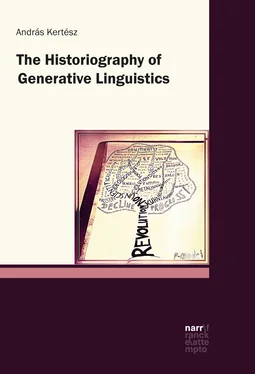KoernerKoerner, E.F. Konrad (1989: 133–134, 2004, pp. 44–45), in agreement with McCawleyMcCawley, James D., argues for (T12) as well, and highlights that, in his opinion, it is the following components of the content of Aspects Aspects which primarily support its revolutionaryrevolutionary nature:
Semantics was included in Aspects Aspects (even if as an interpretive component): »Aspects brought semantics out of the closet« (McCawleyMcCawley, James D. 1976: 6).
The systematic nature of Aspects Aspects exceeded that of Syntactic Structures Syntactic Structures and thus the findings that could be pursued through the application of the theorytheory became relatively transparent.
The theorytheory brought the investigation of syntactic universals to the foreground.
In summary:
| (SP12) |
The basic terms of the historiographyhistoriography of generative linguistics with respect to Aspects Aspects are ›scientificscientific revolution‹revolutionscientificevolutionscientific and ›paradigm‹paradigm, its central hypothesis is (T12) and its framework is KuhnKuhn, Thomas S. (1970) [1962]. |
2.2.2 No revolution
2.2.2.1 Ideology
The following approach illustrates that it is possible to evaluate the role of Aspects Aspects from another perspective than that of the KuhnianKuhnian revolutionrevolutionKuhnian. As is well known, the generative semanticssemanticsgenerative movement was closely related to the circumstance that the role of deep structure, which was introduced in Aspects , was evaluated in two different ways. According to generative semanticists, the generative component of grammargrammar is semantics and the strict division between syntax and semantics collapses. In contrast, the Chomskyan approach maintains that the semantic component is »purely interpretive« (see Section 2.2.0). As the rise of the generative semantics movement initiated by James D. McCawleyMcCawley, James D., George LakoffLakoff, George, Paul PostalPostal, Paul M. and John Robert RossRoss, John R. is closely related to the appearance of Aspects , we now briefly discuss the conflict between this movement and Chomskyan interpretive semanticssemanticsinterpretive. The evaluation of the conflict between them is similar in HarrisHarris, Randy Allen (1993a, b, c), HuckHuck, Geoffrey J. & GoldsmithGoldsmith, John A. (1995), MurrayMurray, Stephen O. (1994), SeurenSeuren, Pieter A.M. (1996), and Seuren (1998); we exemplify this conception by Huck & Goldsmith (1995).
The ›official‹ chronicle generally accepted as a result of NewmeyerNewmeyer, Frederick J.’s (1980, 1986a) works – which was also propagated in widely used textbooks such as RiemsdijkRiemsdijk, Henk and WilliamsWilliams, Edwin (1986) – represents the process leading from the appearance of Syntactic Structures Syntactic Structures to later developments as a continuous and linear progressprogress. According to this view, generative semanticssemanticsgenerative is seen as a regressive episode which justly lost the battle against the more progressive interpretive semanticssemanticsinterpretive, because it was both theoretically and empirically inferior to the latter.
HuckHuck, Geoffrey J. & GoldsmithGoldsmith, John A. (1995) – just like HarrisHarris, Randy Allen, MurrayMurray, Stephen O. and SeurenSeuren, Pieter A.M. – reject this ›received view‹. They ask the following question: If – according to the received view – the generative semanticssemanticsgenerative movement fell apart because its tenets were refuted by the proponents of Chomskyan interpretive semanticssemanticsinterpretive, then how could it happen that the very same tenets were integrated into the later development of generative linguistics? They answer this question in the following way (Huck & Goldsmith 1995: 92–93):
| (T13) |
The received view according to which Chomsky’Chomsky, Noams interpretive semanticssemanticsinterpretive refuted the tenets of generative semanticssemanticsgenerative is »essentially ideologicalideology in character and scientifically unjustifiable.« |
As their historiographicalhistoriography framework, the authors choose LakatosLakatos, Imre (1970b). They believe that within the framework of Lakatosian ›scientificscientific research programresearchprograms‹ it is not possible to identify clear empirical grounds in the arguments put forward in the debate on which a decision between the two approaches could be based.1 Consequently, there is no empirical, theoretical and conceptual – i.e., scientific – reason for the victory of interpretive semanticssemanticsinterpretive over generative semanticssemanticsgenerative (HuckHuck, Geoffrey J. & GoldsmithGoldsmith, John A. 1995: 6–7, 91–95). Namely, the arguments put forward against the claims of generative semanticists were not strong enough to refute them; what is more, the tenets of the two approaches are compatible. Huck and Goldsmith devote special attention to argumentation, because they »understand that scholarly argument forms a crucial part of scientific life« (Huck & Goldsmith 1995: viii). That is, the downfall of generative semantics cannot be explained by its theoretical and empirical deficiency. Rather, it has to do with other – ideologicalideology, argumentative and rhetoricalrhetoric – factors. Thus, the victory of Aspects Aspects over generative semantics must not be seen as the result of a linear and progressive process.
In summary:
| (SP13) |
The basic terms of the historiographyhistoriography of generative linguistics are ›ideology‹ideology, ›rhetoric‹rhetoric and ›argumentation‹, which capture the relationship between interpretive semanticssemanticsinterpretive as discussed in Aspects Aspects and generative semantics;semanticsgenerative its central hypothesis is (T13) and its framework is LakatosLakatos, Imre (1970b). |
2.2.2.2 Untenable methodologymethodology and the clash of two kinds of personalities
As the rise of the generative semanticssemanticsgenerative movement is closely related to the appearance of Aspects Aspects , in this section we discuss the evaluation of this book from the perspective of generative semanticists, using the example of LakoffLakoff, Robin (1989).1 Robin Lakoff’s central hypothesis can be summed up in the following way:
| (T14) |
The intellectual differences between interpretive and generative semanticssemanticsgenerative triggered by Aspects Aspects originate from |
|
(a) |
the different evaluation of the scientificscientific method, and |
|
(b) |
the differences between two kinds of personality involved in the debate. |
As for (T14)(a), Robin LakoffLakoff, Robin believes that one of the reasons why the war about deep structure started is that ChomskyChomsky, Noam attempted to force the methods of the natural sciencesciencenaturals onto linguistics, which, in her view, was fundamentally mistaken and harmful to the development of linguistics.2 With regard to this, she points out the following:
First, as opposed to the natural sciencesciencenaturals, in the humanities – to which linguistics belonged and belongs, according to LakoffLakoff, Robin – there were no uniform paradigmsparadigm, but different views held simultaneously, due to the fact that the object of investigation could be approached from various perspectives. Therefore, in the humanities, the style of argumentation was gentlemanly, acknowledging the pluralismpluralism of views (Lakoff 1989: 964). There were no fights whose goal was to decide who the best scholar was, or who pursued real science. In contrast, in the light of the solid empirical basis and methodologymethodology of the natural sciences, the differences between the various views are of minor importance. Even if there appear to be distinct views, in principle it is easy to choose between these views based on the generally accepted methods and the solidity of datadata, and, quite evidently, the winning view is sooner or later accepted by the great majority of the scientificscientific community. Since ChomskyChomsky, Noam forced the methodology of the natural sciences on linguistics, a methodology which is unsuited to the examination of the variety, complexity, and contradictorycontradiction nature of the investigated data, two consequences followed immediately: Chomsky introduced »the tradition of contentious and acrimonious adversarial argumentation« (Lakoff 1989: 967) into linguistics, and along with this, »there was no place for pluralism « (Lakoff 1989: 968; emphasis added).
Читать дальше












